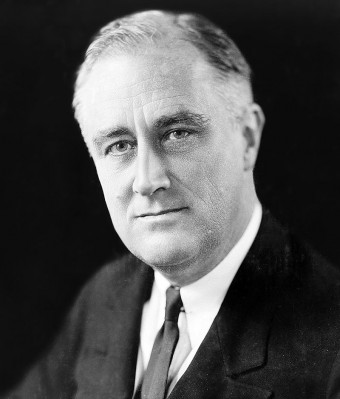This Day in History: January 6th- Four Freedoms
This Day In History: January 6, 1941

Equality of opportunity for youth and for others. Jobs for those who can work. Security for those who need it. The ending of special privilege for the few. The preservation of civil liberties for all. – Four Freedoms Speech
One of the most famous and influential political speeches on the subject of freedom was delivered by President Franklin Delano Roosevelt on January 6, 1941. In his annual State of the Union Address, he explained in bold, yet simple, terms the conditions necessary for freedom to flourish.
When Roosevelt was elected to an unprecedented third term as president in 1940, a good chunk of Europe had fallen to the invading Nazis, and Great Britain was struggling to hold them off. Many Americans still thought this conflict was strictly a European affair, but FDR saw the bigger picture. Roosevelt believed that by coming to the aid of Great Britain, the U.S. would be fighting for universal freedoms all people had the right to possess and enjoy.
The principles laid out in Roosevelt’s Four Freedoms were also the basis of the Atlantic Charter declared by FDR and Winston Churchill in the summer of 1941, and were included in the United Nations Declaration of New Year’s Day, 1942. In addition, the Four Freedoms were President Roosevelt’s inspiration for an international organization that one day became the United Nations.
The Four Freedoms section of his speech wasn’t added until the last draft. In the White House study while writing it, Roosevelt announced he had an idea for the ending. According to FDR’s assistant, Samuel I. Rosenman, “We waited as he leaned far back in his swivel chair with his gaze on the ceiling. It was a long pause—so long that it began to become uncomfortable. Then he leaned forward again in his chair and dictated the Four Freedoms. He dictated the words so slowly that on the yellow pad I had in my lap I was able to take them down myself in longhand as he spoke.”
Roosevelt dictated:
“In the future days, which we seek to make secure, we look forward to a world founded upon four essential human freedoms. The first is freedom of speech and expression — everywhere in the world. The second is freedom of every person to worship God in his own way — everywhere in the world. The third is freedom from want — which, translated into world terms, means economic understandings which will secure to every nation a healthy peacetime life for its inhabitants — everywhere in the world. The fourth is freedom from fear — which, translated into world terms, means a world-wide reduction of armaments to such a point and in such a thorough fashion that no nation will be in a position to commit an act of physical aggression against any neighbor– anywhere in the world.”
If you liked this article, you might also enjoy our new popular podcast, The BrainFood Show (iTunes, Spotify, Google Play Music, Feed), as well as:
- Smedley Butler and the Business Plot
- 5 Fascinating Vice-Presidents You’ve Probably Never Heard Of
- The Surprisingly Recent Time Period When Boys Wore Pink, Girls Wore Blue, and Both Wore Dresses
- The Amazing Life of Theodore Roosevelt
| Share the Knowledge! |
|





One comment